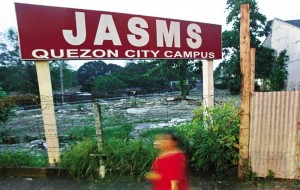
THE VACANT lot at the Jose Abad Santos Memorial School where condominiums and a mall will rise. RAFFY LERMA
MANILA, Philippines–Sixteen-year-old Anna was born with microcephaly, a rare neurodevelopmental disorder. While she would have struggled in a traditional school, she easily found a safe haven in a pioneer progressive school in Quezon City.
Anna is now an eighth grader at the Philippine Women’s University-Jose Abad Santos Memorial School (JASMS) in Barangay West Triangle, a school which is known for integrating children with special needs into the regular student body. The school is also known for its liberal curriculum, with a focus on the environment, heritage and the arts.
Christine Caoile, Anna’s mother, noted that the school’s landscape of low buildings and open spaces lined with grass and trees has helped Anna maintain a stable “emotional quotient.”
“This space is a breather for her. She can move around, and I don’t need to worry she will meet an accident,” Caoile says, in a recent interview with the Inquirer.
But now the school is facing a makeover.
JASMS students’ parents recently learned of plans to construct two 33-story condominium buildings and a commercial complex on where the school now stands along Edsa.
Earlier, it was reported that Ayala Land subsidiary Amaia Land Inc. had been brought in for the development, by STI Education Systems Holdings Inc., which has acquired shares in JASMS.
Under the plan, the 2.2-hectare JASMS campus will be whittled down to make way for the condominium and mall. The school community, from primary to college level, will be relegated into one nine-story building taking up roughly 2,000 to 3,000 square meters of the property.
When Caoile told her daughter about these planned changes, Anna could only ask: “Mommy, why?”
JASMS parents are also asking the same question.
What alarms the JASMS Parents Association (JPA) the most is that there are already ongoing moves to implement the planned development.
On Sept. 29, Quezon City Councilors Ricardo Belmonte and Jesus Suntay submitted a resolution asking that the development be granted an exemption from the city zoning ordinance.
This prompted the JPA to send a letter of opposition to all Quezon City councilors, Mayor Herbert Bautista and Vice Mayor Joy Belmonte.
JPA president Vicente Antonio Pijano III decried the “rush,” underscoring that the school community, particularly the students and parents, was never consulted about the planned development.
“One-third of the students of JASMS are children with special needs which fall under PWD law. You can’t build anything for them without including them in the planning,” an outraged Pijano said in an interview.
In the JPA letter of opposition, the parents stressed that children with special needs under JASMS Main Streaming Program consider the school their “second home.”
“The lack of consultation and information related to the proposed project would subject these students to undue stress and uncertainty,” the parents said.
When the Inquirer interviewed the parents on Thursday, they pointed out that the redevelopment has already started at JASMS. For instance, a music room was being refurbished while classes were ongoing. The parents have also learned of a memorandum to the school administration to start transferring the classes to other rooms.
“They’re disrupting the learning process. Why are they doing this in the middle of the school year?” parent Lumen Tamayo complained.
The parents are also worried about the safety of the children while construction is ongoing.
“There are around 180 students with special needs here, with different cases [of developmental disorders]. They will panic. And if you put them in a new environment, that will disorient them even more,” Tamayo pointed out.
The parents, in their opposition letter to the city government officials, also noted that “the location of a mall and massive residential towers will not support an environment conducive for teaching and learning” for any of the students.
The parents also feared the planned construction would cut the trees around the campus, including a heritage tree.
“For the last 70 years, JASMS has been a safe haven for progressive education in the country. That means space, teaching the children about the environment, heritage, the arts. How can you do that on top of a mall, or cooped up in a building?” Pijano asked.
The parents urged the city council not to grant a zoning exemption to the development until their concerns are addressed.